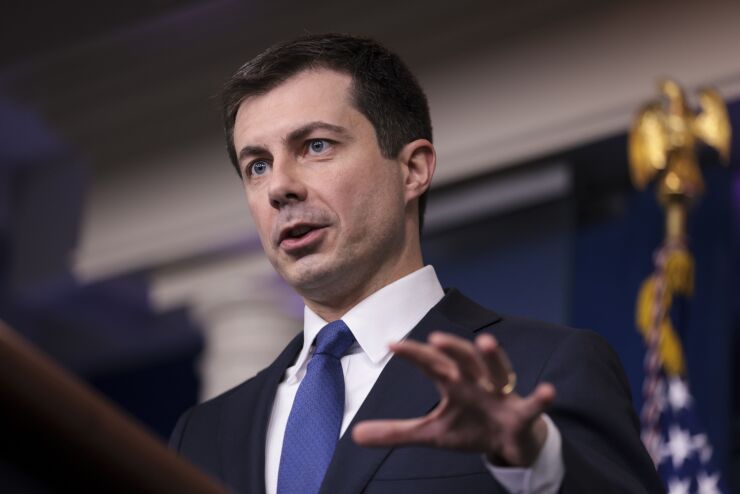The high cost of American infrastructure and an ongoing controversy over the Biden administration’s position on highways were top concerns voiced by senators Thursday during a hearing on the U.S. Department of Transportation’s FY23 budget appropriation.
Both Democratic and Republican members of the Senate Appropriation Committee's Subcommittee on Transportation, Housing and Urban Development raised concerns over the cost of building infrastructure in America.
Transportation Secretary Pete Buttigieg, who testified at the hearing, acknowledged the problem and said the administration is trying to streamline administrative processes and repair the supply chain.

“The bottom line is America struggles to deliver major projects in infrastructure on time and on budget,” Buttigieg said. “Anytime any reasons for that are under control by our agency, I’m going to go after them energetically."
Subcommittee Chair Sen. Ben Schatz, D-HI, cited an Eno Transportation report that found the cost of building a mile of central subway in San Francisco is $920 million compared to $323 million in Copenhagen.
“It should not be three times more expensive to build a subway system in San Francisco than it is in Copenhagen,” Schatz said.
Schatz blamed the high costs on NIMBYism, or not in my backyard-ism, as well as a federal political bias that favors highway over transit projects.
“We need to admit that this is a real problem, figure out why it’s happening and do better,” Schatz said. “The federal government has limited tools to do so but we need to use them to lower” project and financing costs, he said.
Buttigieg said the Infrastructure Investment and Jobs Act features helpful provisions like the so-called One Federal Decision, a Trump-era move to streamline the review process for major infrastructure projects, and a federal permitting dashboard.
Sen. Mike Braun, R-Ind., criticized the administration’s recent move to rescind another Trump-era measure trimming the environmental review process, and restore stronger reviews for federal projects as part of the National Environmental Policy Act. Braun said the move would drive up costs and delays of federally funded projects.
“I just really think that when we take added regulation and add it to what’s already an inflated economy in terms of costs, that it’s going to delay getting the critical infrastructure done,” Braun said. “I just wonder why we’d want to add more to it at a time when inflation is the number one issue.”
Buttigieg responded that the administration wants to “meet a high standard of accountability and marry that with a high standard of efficiency.”
Also at the hearing, senators revived an
Echoing his previous comments in defense of the memo, Buttigieg said law prohibits the DOT from requiring states to spend formula funds in certain ways and that the administration respects state flexibility on the issue.
Sen. Shelley Moore Capito, R-W. Va., a vocal critic of the memo, said she’s hearing from state DOTs that the department is “still putting a foot on the scale for certain types of projects.”
“My understanding is it’s not only the December memo but [the department has] doubled down in terms of the same types of concepts going to certain grant programs and other kinds of funding opportunities,” Capito said. “What do you see over the next three to six months that you all are going to be putting out in terms of guidance? Is this going to be a consistent message through every program?”
“The most important thing will be to ensure there’s clear communication and understanding as projects go out,” Buttigieg responded. “You will continue to hear concepts mentioned in the memo promoted by the administration,” he added.
“The best thing I can offer is, if it is ever your impression that a specific project that is otherwise lawful that a state seeks to pursue with formula dollars is in any way being unreasonably or unnecessarily delayed or discouraged by the department, I would want to know that right away,” he said.
The hearing comes as Congress this week began to consider FY23 appropriations for various departments.
Biden’s FY23 budget provides $142 billion for the DOT to spend in FY23. That includes $105 billion in new appropriations and $37 billion in advance funding from the IIJA. Nearly half of that, $69 million, would go to highways. Aviation would see $23.9 billion, mass transit $21.1 billion, and railroads $17.9 billion.
The final DOT funding levels — and all FY23 funding — remains up in the air, Sen. Susan Collins, R-Maine, said during the subcommittee hearing.
“As we begin our work on fiscal year 2023, it’s important to note that there’s not yet a budget agreement in place, and overall funding levels remain to be determined as well as the split between defense and nondefense [budgets],” Collins said.





